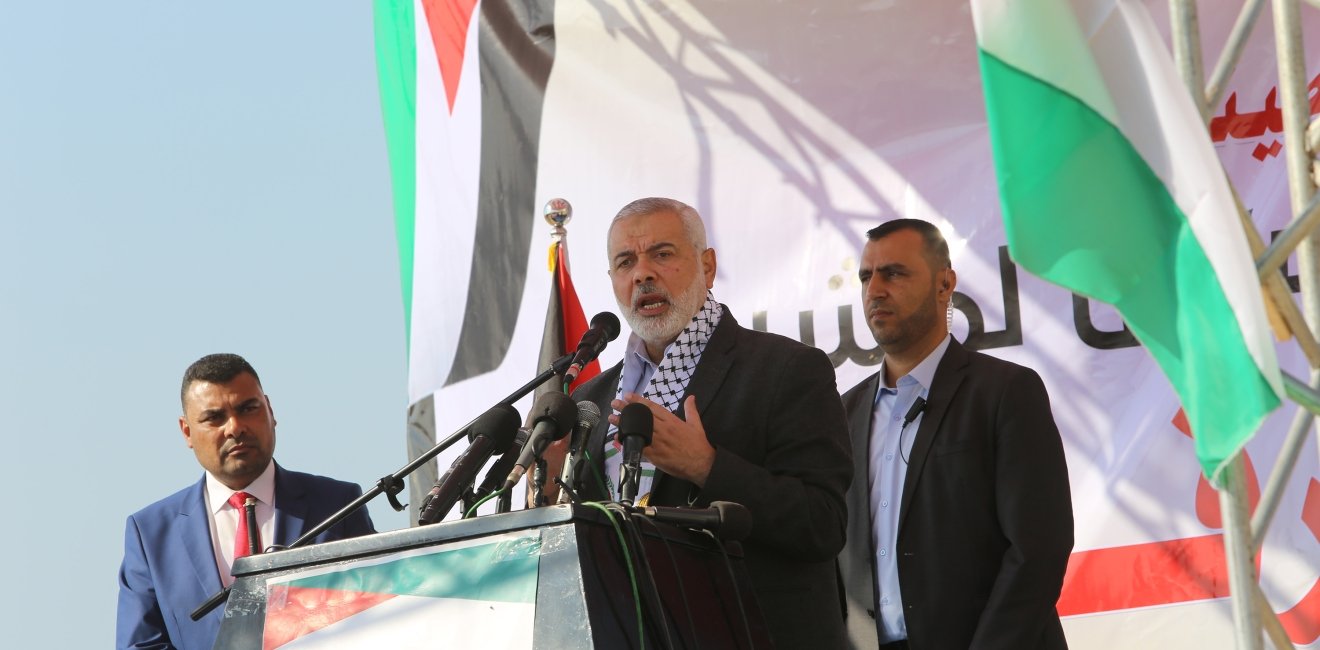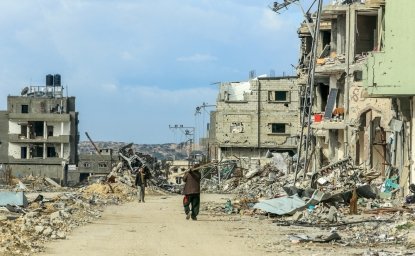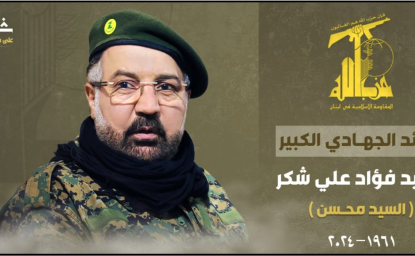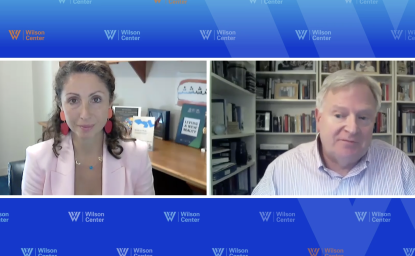These reactions were published before the nature of the attack on Ismail Haniyeh was determined.
Escalate to de-escalate
James Jeffrey, Chair, Middle East Program
It is hard, obviously, to predict what will come next, but the Israelis, who likely ordered the strike on Ismail Haniyeh (and Hezbollah’s military chief), believe they are in an “escalate to de-escalate” mode; Israel’s assorted enemies will not challenge them once they see its capabilities, intentions, and willingness to act even in face of Washington’s caution, and so a negotiated (Hamas, Hezbollah) outcome advantageous to Israel is likely.
Here is their logic: Israel’s military, government, and much of the population sees itself in an existential fight with all of Iran’s proxies and Iran itself. This fight is the culmination of a 20-year, Iranian-led campaign to undermine state sovereignty and build up proxies in Iraq, Syria, Lebanon, Yemen, and Gaza, along with arms programs beginning with Iran’s nuclear weapons and including Hezbollah and Houthi regional long range strike capabilities. This was all done to drive the United States out of the region, weaken, and then eventually destroy, Israel, and thereby establish regional hegemony.
The Israelis, unlike Washington, which has a hard time understanding these implications, are focused not on de-escalation or ceasefires as ends in themselves but on a campaign victory that will reverse Iran’s 20-year success and leave Israel markedly less vulnerable to another, or even bigger, October 7. Thus, Netanyahu seeks a ceasefire in Gaza but only under conditions that would make it difficult for Hamas to again seize control and seriously threaten Israel. The same goes for a negotiated outcome with Hezbollah in Lebanon.
As Israel believes it has the military advantage over Hamas, Hezbollah, and Iran, it is using that advantage to obtain tactical and strategic victories by fighting and negotiating (ceasefire talks with Hamas), as it believes all its enemies in the end prefer accepting a negotiated result with limited Israeli wins rather than the uncertainty of a major war, one of whose more likely outcomes could be a major defeat, such that Hamas now faces.
The one hope in a dismal military situation for Iran and its proxies is that Washington will restrain Jerusalem to avoid a regional conflict and huge civilian casualties. But Israel believes that either advantageous negotiations, or if necessary, a larger war is necessary to restore deterrence (as it cannot really totally eliminate the Iranian-led alliance) and thus will defy Washington if necessary.
An embarrassment for Iran
Haleh Esfandiari, Distinguished Fellow & MEP Director Emeritus
The assassination of Ismail Haniyeh, the senior political leader of Hamas, while on Iranian soil, is being analyzed from many perspectives. Let’s add another: it is an unmitigated embarrassment for the Islamic Republic. Haniyeh met his death while in Iran to take part in the inauguration ceremony of Iran’s recently elected president, Massoud Pezeshkian, and in a residence provided by the Iranian government for their honored guest. Tehran is a principal supporter and ally of Hamas, the main financier of the organization’s activities, and its principal source of arms.
Tehran’s first reaction to the assassination was to point the finger at Israel. Its second was to promise Israel will pay a price. The Supreme Leader, Ayatollah Ali Khamenei, asserted Haniyeh’s death will not pass unavenged, as did one commander of the Revolutionary Guards. The government announced a three-day mourning period—a manner of paying respect reserved for only the most senior government official or men of prominence. Haniyeh’s burial, however, will take place in Qatar, where the Hamas leader was living the last several years and from where he flew to attend Pezeshkian’s inauguration.
Israel, so far, has offered no comment on the on Haniyeh’s death, although it took full responsibility for the killing, a day earlier, of Fuad Shukur, a high-ranking member of Hezbollah in Beirut.
Whatever form Iran’s promised retaliation will take, and however much honored display the regime puts in for Haniyeh, his death is nothing but a mortification for the Islamic Republic. Haniyeh’s security was presumably of high concern to Iran’s authorities, yet it turns out he was staying at an insufficiently protected residence. If the Hamas leader was deliberately separated from the other foreign guests attending the ceremonies, why was he not better guarded? And how did Haniyeh’s assassins find out where he was staying? What does this say about Iran’s air defense systems? If by a hit squad, what does this say about Iran’s intelligence organizations? These are questions the Iranian regime will need to answer.
Direct and indirect retaliation from Iran
This is an excerpt from the original piece published by the Islamists.
Robin Wright, Distinguished Fellow
The July 31 killing of Haniyeh—a former Palestinian prime minister who had served as the chief interlocutor on issues of war and peace for the militant movement—follows four months of escalating tensions that have played out on multiple fronts, most dangerously between Israel and Iran. Haniyeh was killed during a visit to Tehran for the inauguration of President Masoud Pezeshkian. Israel was widely considered to be responsible. The repercussions play out on several levels.
On diplomacy to end the Gaza War: In a statement, the armed wing of Hamas said the assassination would “take the battle to new dimensions and have major repercussions.” During a visit to Singapore, Secretary of State Antony Blinken pledged to end the 10-month-old conflict and release the hostages, including some Americans. In a series of telephone calls with Arab and Israeli leaders, Blinken and Defense Secretary Lloyd Austin III scrambled to keep diplomacy alive and urge military restraint. But prospects for containing violence appeared dim, at best.
On escalation to a wider war: Khamenei said Iran had a duty to avenge Haniyeh’s death. He warned Israel of “harsh punishment,” which could play out on any of several fronts since Iran has military allies in Lebanon, Syria, Iraq, and Yemen. All have pledged for years to challenge Israel’s right to exist. And all have tried to attack Israel since the Gaza war erupted on October 7, 2023.
Iran will feel under pressure to act—directly or indirectly. The attack, which took place on a site in Tehran, is another deep embarrassment for the Islamic republic, which was also humiliated in April after Israel assassinated three Iranian Revolutionary Guard generals in Syria. Its military response—launching more than 330 missiles and drones on Israel—was a spectacular failure.
The initial US reaction was, again, to call for restraint by all sides. Blinken said that Washington has been focused “to make sure that the conflict that emerged in Gaza doesn’t spread, it doesn’t go to other places, doesn’t escalate.” The short-term goal is still to “bring the temperature down everywhere.” That appeared unlikely too.
On tensions between the U.S. and Iran: Khamenei said the US shared responsibility for the attack, since it has supported Israel militarily for years. Blinken denied playing any role or knowing about the assassination before it happened. The timing of the attack undermined the agenda of the new Iranian president, who had campaigned on greater engagement with the West and who was expected to make his debut at the opening of the UN General Assembly in New York in September. In the past, it has been a venue where Iran has made overtures on issues ranging from its nuclear program to diplomatic engagement.
Iran will rally its proxies
David Hale, Global Fellow
The killing of Ismail Haniyeh, a lifelong member of the Hamas terrorist organization and for the past seven years its leader, was unexpected only because it was so audacious. Since Hamas launched its massacre of Israeli and other civilians on October 7, 2023, Israeli officials have maintained all along the goal of destroying Hamas, and a number of senior Hamas military and civilian leaders have been killed. Haniyeh's successor — whose identity at this stage is unclear to outsiders — may think twice about joining in future such colleagues as Houthi spokesman Abdul-Salam, Armenian Prime Minister Pashinyan, or the personal representative of the EU's Josep Borrell at highly visible Iranian ceremonies. Better to spend quality time in a bunker planning the next terrorist massacre.
Iran is, of course, humiliated once again, just as they were last April when Israel and its neighbors repulsed a barrage of Iranian drones and missiles after the killing of a senior IRGC commander and his staff in Damascus. Iran quickly backed down then, not because it wanted to end its war with Israel but because it wanted to re-channel it to the level of its Arab proxies, where Iran enjoys some comparative advantages and bears fewer direct risks. Despite the inevitable bluster, the same pattern is likely now. Iran cannot afford or sustain a direct confrontation with Israel but will carry on through its Arab partners, who provide the cannon fodder that is unlamented in the Persian capital. Expect more proxy missiles on Israel and less predictable terrorism attacks further afield.
The American administration's initial reaction has been to distance itself from the attack. Perhaps in the next news cycle, American officials will remember Hamas terrorists led by Haniyeh have also killed innocent Americans. This blow against terrorism is also a step in restoring deterrence against Iran and its allies—the absence of which is what has generated the carnage suffered by Israelis and Arabs alike in the past 10 months. As Iranian leaders begin to see the costs of its proxy wars, and their own vulnerabilities, their cost-benefit calculus may be re-evaluated. Only then will America and its allies have a chance of restoring regional peace and stability.
Retaliation is inevitable
Joe Macaron, Global Fellow
First, Israel struck the Houthis at the Yemeni port of Hodeidah. Ten days later, Israel targeted Hezbollah’s top commander Fouad Shukr in Beirut and, 12 hours after that, Hamas political bureau chief Ismail Haniyeh was killed in Tehran. Israel is widely considered to have ordered his assassination, as this full court attack on Iran and its proxies has been ongoing since the beginning of 2024. However, it has reached new heights with two high level targets. While the assassination of Haniyeh and Shukr are short-term wins allowing Israel to reclaim prestige and Netanyahu to boost popularity, it does not change the regional dynamics, help US interests, nor make Israel safer. The Middle East is on the brink of a new round of confrontations, which requires US leadership to preserve regional stability.
The timing of Haniyeh’s assassination has linkages across capitals. First, the attack undermined Pezeshkian, a moderate pushing for talks with the US, on his oath ceremony day. Second, China just brokered a Fatah-Hamas unity deal as preparations are underway for the “day after” the ceasefire in Gaza. Haniyeh was the major candidate to lead any “day after” government in Gaza. Given the current situation in Gaza, Hamas cannot elect a new political chief. It is most probable that the political bureau will appoint a temporary caretaker figure, such as Khaled Meshaal or Moussa Abu Marzouk.
Third, this assassination comes just after Netanyahu’s visit to Washington. There is a near consensus in the region that Israel would not have conducted these operations without US support, as voiced by US Defense Secretary Lloyd Austin. Now that President Joe Biden is out of the presidential race, his administration is no longer restricted by electoral calculations and critics on the left of the Democratic Party (the US has denied any prior knowledge of the attack). Fourth, the Israeli government is now more radicalized given the cabinet changes last June and more willing to take such risks.
What happens now? A retaliation is inevitable, sooner or later. Now that Iran is directly involved, a wider regional retaliation is expected. Both Israel and Iran want to avoid the risks of direct confrontation while dancing around deterrence and rules of engagement. If the US does not play a leadership role, as it did after the Israeli strikes on the Iranian consulate near Damascus last April, the room for miscalculation could be much bigger. The Biden administration should put pressure to restrain Israel and Iran, while pushing for an immediate ceasefire in Gaza and keeping indirect communication open with the Iranian regime when needed.
Bolstering support for Hamas
Jamal Nusseibeh, Global Fellow
The assassination in Tehran of Ismail Haniyeh, former Prime Minister of the Palestinian Authority and head of Hamas’ political bureau, is both a clear provocation and a clear sign of intent. It appears Haniyeh was targeted by a missile, presumably from an Israeli aircraft or base. The assassination comes on the heels of Israel’s assassination of Hezbollah commander Fouad Shukr in Beirut.
Both attacks occurred immediately following the return of Israeli prime minister Netanyahu from Washington, DC, leading to speculation in the region that the US had pre-approved them. The Biden administration has expressed it had no knowledge of the attacks—either way, this will cause additional damage to the US image in the Middle East and additional risks to its interests and security.
The assassination was presumably intended to have a negative impact on the current ceasefire and hostage exchange negotiations between Israel and Hamas. Haniyeh, who was based in Qatar, was directly involved in these negotiations. Reports have indicated that at times the Israeli negotiating position was preventing progress on an agreement, although Hamas may now be pushed into taking a harder line.
Haniyeh’s killing has impacted all Palestinians, whose leadership called for national mourning, and who went on strike today across the Occupied Palestinian Territories, bolstering support for Hamas. It has also provoked Iran, whose sovereignty has been violated and which will need to respond to the assassination of a guest in its territory. It seems that the intent of the Israeli government is to ensure the conflict spreads, since they cannot exit the quagmire they have dug themselves into in Gaza. Unless the Israelis stop killing Palestinians and others and recognize that a political solution ensuring equal rights for all people living in Israel and the Occupied Palestinian Territories (whether in two states or in one) is the only way to achieve security, the world will be dragged into a devastating regional conflict.
The views represented in this piece are those of the author and do not express the official position of the Wilson Center.





